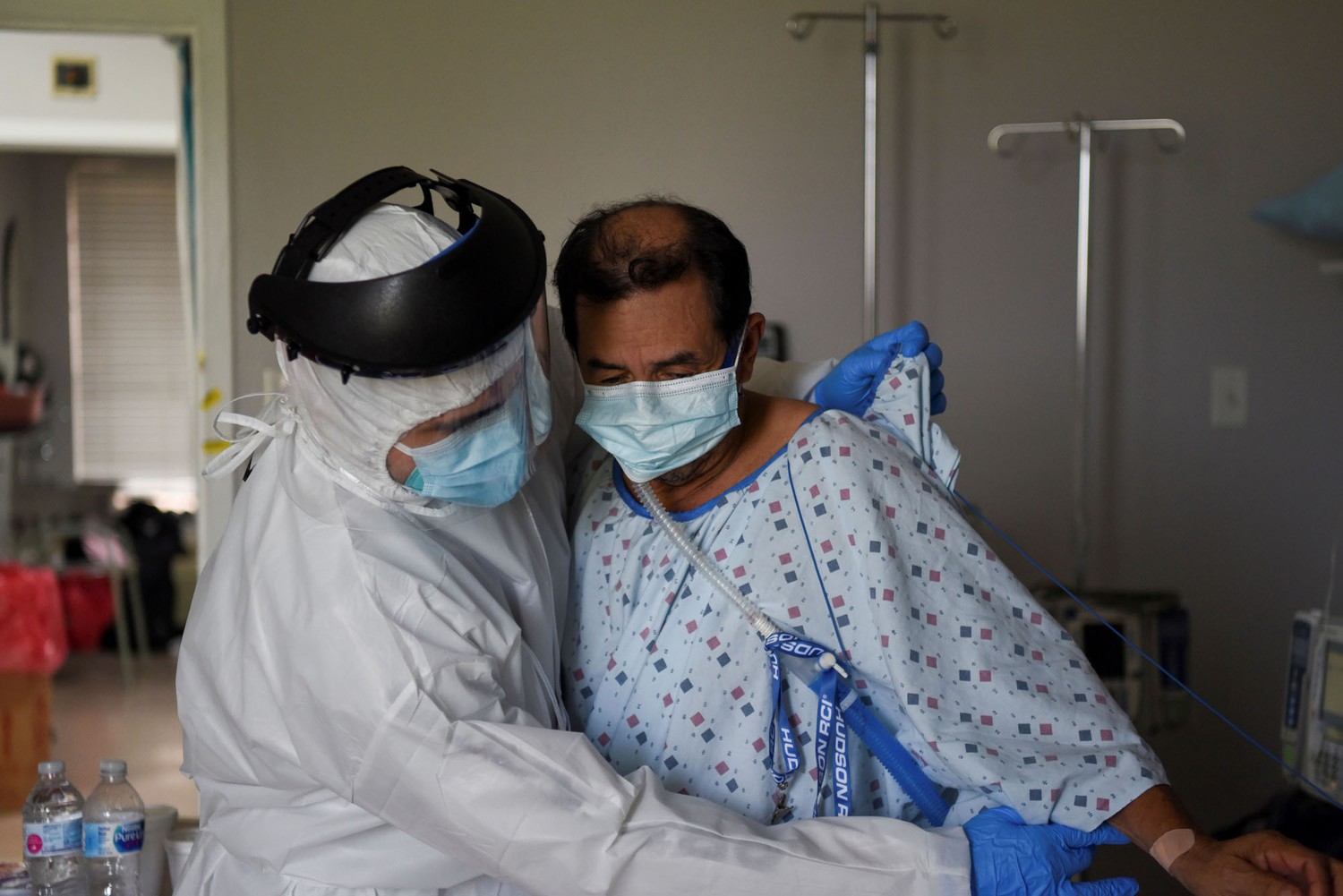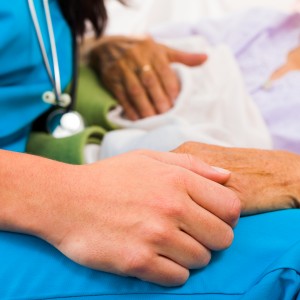3 Blessed be the God and Father of our Lord Jesus Christ, the Father of mercies and the God of all consolation, 4 who consoles us in all our affliction, so that we may be able to console those who are in any affliction with the consolation with which we ourselves are consoled by God. 5 For just as the sufferings of Christ are abundant for us, so also our consolation is abundant through Christ. [2 Corinthians 1:3, NRSV]
[L] Medical staff helps Covid-19 patient get up [R] Nurse holds patient’s hand.
How do people deal with devastation? In real life, everyone has a story to tell. We listen to our great benefit. Personal stories of post-patient-deaths from three medical staff are touching stories for reflection as we move into the passion and death of the Lord in Holy Week.
These stories come from a New York Times opinion-video, produced by Alexander Stockton. The video is titled “How Front-Line Workers Are Struggling to Cope with Losing Coronavirus Patients | NYT Opinion”. We accessed it on 31 August 2022 at https://www.youtube.com/watch?v=tlsYYIshbDw. In the op-ed, ‘The Wounds Are Still Fresh’, which posted this video, Sahan Hapangama, Louis Galabert and Sarah Norris noted that front-line medical workers are struggling with the devastation that comes after patients have died. Their brief op-ed continues:
“Once a global epicenter of the pandemic, New York City has — for now — brought things under control. But where does this reprieve leave front-line medical workers? In the video above, we get a rare and intimate look at three — a hospitalist, a physician assistant and a palliative care physician — who worked at one of the hardest-hit hospitals in the Bronx. They’re confronting an unanswerable question: Did they do enough? The deaths may have subsided, but medical workers are still dealing with the devastation.”
Dr. Sahan Hapangama (hospitalist):
“I had a young patient who was doing very well, and then one morning his blood pressure started dropping. Unfortunately, he passed away. I kind of broke down and just cried. I tried to pull myself together because I wanted to notify his mother about what had happened and she was so appreciative but I feel like I failed him.”
“I think as doctors we try to put on a strong front and put on a strong face, but the anxiety, the fear, the exhaustion, and the absolute frustration, even now, months later, I’m still trying to battle those emotions.”
“The scars on my face from the N95s will certainly heal, but the emotional scars I will have for the rest of my life.”
Louis Gelabert (Senior Physician Assistant):
“Sometimes I wouldn’t sleep. My mind was just going continuously thinking of not doing the right thing for the patient. That feeling never left me. It just hits me. It’s still fresh. It’s still fresh; the wounds are still fresh.”
The chaos and death Covid-19 brought to New York City hospitals have subsided. But health care workers are now struggling with what comes next.
“There’s one patient that I will carry with me for a very long time, an elderly gentleman. We knew that a patient of his age, with his comorbidities (the fact that people who have a disease or condition also have one or more other diseases or conditions) wouldn’t survive being on a ventilator. I contacted the family. The brother asked me if he can pray with him. I took my cell phone over a bit to the stretcher side of the patient in a very noisy emergency department, and through my ppe, my mask, placed the phone close to the patient’s ear. I leaned in and said, “Your brother wants to pray with you.” His eyes suddenly opened up wide. I felt like the family was there with us, was witnessing everything we were doing for his loved one. In about a week’s time, I found out the patient succumbed to his illness. It hurt. I cried (looking deeply sad, quiet, and solemn, pausing momentarily before speaking again). I just felt that I was very close with the family. I felt like I knew them.”
Dr. Sarah Norris (Paliative Care):
“Every time someone dies, every doctor, every nurse, every therapist feels responsible. I think about the patients who died. I think about their families. I thought about them a lot on Mother’s Day, on Father’s Day (Dr. Sarah’s voice starts cracking as she speaks with obvious deep emotions).”
“I can’t pull off what to say to another physician when their patient dies. It’s heart-wrenching to see their slumped shoulders, see their head down, see them using paper towels (her voice cracked, her face in torment, pausing before continuing), because I don’t know what to say.”
“How do we as doctors and nurses decide we did a good job if somebody dies? I think that part of the definition is ‘Did you know them?’ Did you take time to get to know the patient?’”
Louis Gelabert: “If they were on their last breaths, we would hold their hands and we would whisper to them, ‘It’s okay, we’re here with you. We’re here with you.’”
Dr. Sarah Norris: “When you the doctor and you the nurse having a spectacularly bad moment, you need someone to look in the eyes and tell you, ‘I know you’ve done everything you know how to do, and it’s not your fault.’”
Dr. Sahan Hapangama: “We look out for one another while trying to look out for the patients as well. It helps strengthen us.”
Louis Gelabert: “There was one day, we intubated three patients within one hour. I noticed that my phone had multiple text messages. My wife sent me videos of the neighbourhood kids. They made signs and I actually have those signs hung up on my porch outside. [One huge sign reads “Thank you, Louie. Thank you, uncle Louie” with colourful rainbow.] What got us through the hardest moments during this time were the people, our colleagues and our loved ones that were supporting us. And every day before I do a shift, I tap the sign with my hand before I get into the car. No, I’m never taking it off.”
Now imagine the early disciples, together with the eleven apostles (Judas Iscariot having killed himself), hiding in the Upper Room for three days after the excruciating passion and death of Jesus. Imagine the haunting scenes of the humiliating torture and crucifixion of Jesus hanging over their heads and the chaos in their hearts. How did they deal with the devastation? Were they guilt-ridden? At the material time, “did they do enough” for the Lord, such as not abandoning him but keeping company with him? How chaotic were their emotions, including those lamenting all the way as they took flight, left Jerusalem, and headed back to their respective villages (such as Emmaus), their hopes and dreams dashed? Today, in our own time, “did we do enough” for the Lord who said: “Truly, I say to you, as you did it to one of the least of these my brethren, you did it to me” (Mt 25:40)?
Copyright © Dr. Jeffrey & Angie Goh, September 2022. All rights reserved.
You are most welcome to respond to this post. Email your comments to jeffangiegoh@gmail.com. You can also be dialogue partners in this Ephphatha Coffee-Corner Ministry by sending us questions for discussion.


